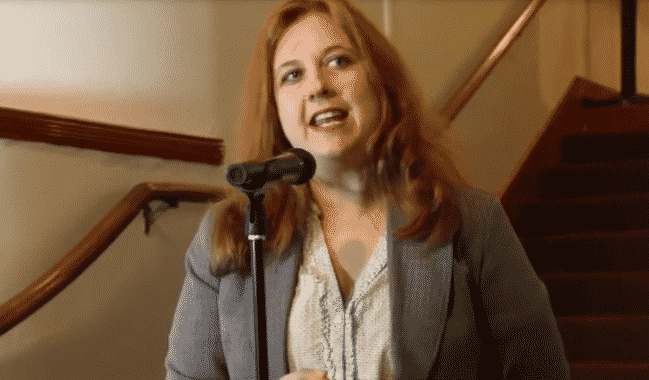SEATTLE, WA – You just can’t make this stuff up.
First, a member of the Seattle city council votes to defund police by a huge amount, and adds that further cuts are necessary, all in the name of social justice.
Then, someone commits a minor crime against her, and she wants the police to respond and prosecute the “criminal.”
Then, she also helped write city legislation that makes the offense not a crime, and not punishable by jail time and restitution.
Are you keeping up?
Screenshot courtesy of westseattleblog
It’s been said that social justice warriors don’t really know what they want. They just want something. And they want to be mad.
That couldn’t be a more accurate statement to describe the scenario seen this week in Seattle.
Lisa Herbold is a member of Seattle’s uber-liberal city council. She’s been a main campaigner for the “defund the police” movement, casting a vote to cut right at 20% of the Seattle Police budget. That move has passed the council and gone into effect.
Herbold called the police, though, when a man threw a rock at her West Seattle home, striking a living room window with a sound like a gunshot, she said.
Jason Rantz, with KTTH Radio researched the matter and read the police report where Herbold stated:
“She was on the west side of the living room near the kitchen when she heard a loud noise that sounded like a gunshot and dove into the kitchen for cover.”
A neighbor who witnessed the incident said he spotted an “unathletic and bad runner” leaving the scene.
Herbold expressed that she wants a criminal investigation into the incident at her home. And rightfully so.
The problem with that notion is that Herbold has also authored legislation that would make minor crimes like throwing a rock at someone’s house essentially non-punishable. Or at least easily defended, with no real liability for the “criminal.”
Herbold’s new bill, dubbed the “poverty defense” and modeled after a draft proposal by radical defenders, instructs prosecutors to consider dismissing charges against a suspect “experiencing symptoms of a behavioral health disorder” while committing the crime.
Under current laws, a mental disorder means any organic, mental, or emotional impairment that has substantial adverse effects on a person’s cognitive or volitional function. Under Herbold’s “poverty defense” proposal, most misdemeanor suspects would be let off the hook if they commit a crime to meet a basic need.
In other words, if you are robbed of your wallet and cell phone, and the thief NEEDED those things, there is no crime.
Jason Rantz agreed that the criminal should be caught and punished. There’s just the problem of the new legislation:
“He broke the law and should be punished.
“But in Seattle, thanks to councilmembers like Herbold, we don’t punish criminals. We have an aversion to putting people in jail who are threats to society.
“Usually, the council members aren’t victims themselves. They just create the victims with their permissive policies.”
Victoria Beach, Seattle Police Department chairwoman of the African-American Community Advisory Council, commented:
“They don’t know what they’re doing. There is no trust because they showed a lack of experience rushing (and) not having Chief (Carmen Best) at the table and not having a plan.”
This Seattle scenario strikes a familiar chord when it comes to how to fund departments and how to interact between city council and the police department in a way that best serves the public.
A perfect case-in-point is the debacle created by Portland, Oregon city council member Jo Ann Hardesty.
Hardesty was easily the loudest voice on the city council in shouting to defund the Portland police, siding with groups like Black Lives Matter and Antifa. That city voted to strike a large portion of the budget, saying the police aren’t doing what the city needs to help its citizens, with the ultimate goal of disbanding the department altogether.
 Portland City Commissioner Jo Ann Hardesty screenshots of horror from YouTube
Portland City Commissioner Jo Ann Hardesty screenshots of horror from YouTube
Imagine the nationwide astonishment then, when Hardesty was leaving a casino and called for a ride-share from a Lyft driver.
Due to Lyft’s strong Covid-19 precautions, the driver was driving with the windows down and wearing a mask. Hardesty became angry with the driver because he wouldn’t put the windows up, and the driver decided to terminate the ride and call for another driver.
Hardesty called 911 to report the event, because she was having an argument with a ride-share driver that she couldn’t resolve because she wasn’t being remotely reasonable.
She called the department she voted to defund because they weren’t doing what she wanted them to do…in order to resolve a petty argument with a 62-year-old man who was doing his job as required.
You just can’t make this stuff up.

Seattle considers ordinance that would excuse crimes, including assault, for drug addicts and the homeless
December 13, 2020
The following article contains editorial content written by a retired Chief of Police and current staff writer for Law Enforcement Today.
—
SEATTLE, WA- When it comes to insane American cities, there are a number of contenders. Of course, Portland comes to mind immediately because not too many cities can claim the number of lunatics per capita as Portland. Then of course, there is San Francisco, the sidewalk defecation capital of the United States.
However, not to be outdone, there is also Seattle, where the city council is actually proposing excusing misdemeanor crimes if they are tied to either poverty, addiction or mental disorders, according to Fox News.
Don’t tell that to Matthew Humphrey, who owns a barber shop. Steele’s shop was the location of a burglary where criminals taped the back-door window, then took a slingshot and shattered the glass. Within a matter of six minutes, the criminals had taken nearly $4,000 worth of goods.
Humphrey told KOMO News that he figured thieves would sell the high-end jackets and hair products online in order to turn some fast cash. He then found out about the proposal in Seattle, which would in essence allow thieves to steal, then re-sell items in order to generate the money to meet basic needs such as food or rent. He was shocked.
“I think it’s absolutely insane,” Humphrey said.
The new code being proposed in Seattle would require municipal court judges to consider a so-called “poverty defense” when a case comes before them. The proposal is expected to receive further deliberation in January.
Under the proposal by City Council member Lisa Herbold, there are up to 100 assorted misdemeanor offenses whereby a suspect would be able to use the poverty defense in court.
One person who thinks the idea is peachy keen is Anita Khandelwal, who is the top public defender for King County, who says the current system isn’t working for either offenders or victims.
“It’s meeting nobody’s needs,” she said, according to KUOW. “This is not that we don’t care about the business community or about people who have experienced harm. It is that we know that this process—this processing of human beings throughout the system—is harmful to our clients and again very racially disproportionate, and also not getting business owners what they need either.”
Not to be outdone, Khandelwal also thinks the public should have to pay into a fund for restitution, to compensate theft victims if the offender is unable to pay them back. So, in other words, whack the businesses and homeowners twice, once by assessing them for a public restitution fund, and then allowing the criminals who break into their homes off without penalty.
However, there are still a few sane people in the Pacific Northwest, among them former Seattle city councilman Tim Burgess, who told reporters, “It sends this powerful signal that as city government, we don’t really care about this type of criminal behavior in our city,” believing that such a policy could open the floodgates for criminal activity.
According to feckless Seattle Mayor Jenny Durkan, crime has been escalating in Seattle this year, with a 525% spike in crimes, she said.
In addition, the homeless population in Seattle has grown over 5% since last year, according to recent King County data. Estimates are that at least 26% of those counted are dealing with either addiction or mental health problems.
Humphrey said while he understands the concept and agreeing that it is probably well intended, it’s hurting other people.
“It’s one of these well-intended concepts (of) we want to take care of people that can’t take care of themselves, but what you are really doing id hurting other people,” he said.
Another critic of the proposals said it would lead to non-stop shoplifting. That however didn’t set well with some.
“We know that this is simply fear-mongering,” said Tiffani McCoy, a lead organizer for Real Change in comments to the council’s Public Safety Committee. “The early attacks against it are rooted in anti-poverty bias.”
Stealing and then flipping the stolen goods is not the only element that is under consideration; another element known as the “no legal alternative” option is also being considered.
Under that scenario, if someone shoplifted from a grocery store, yet claims they didn’t know there was a food bank located right around the corner, they could be protected under the poverty defense.
These people are literally crazy, and one person told the city council that it is fair to ask defendants to explore legal means to acquire stolen items before they commit a crime, Assistant City Attorney John Schochet told city council members.
However, Khandelwal was having none of that, you know personal responsibility.
“To show that there wasn’t something nearby seems to just go in the direction of our criminal legal system has been, ensnaring individuals within it,” she said.
Humphrey was not impressed by that argument.
“It’s a little upside-down world,” he said. “The end result is small companies like mine have to close their doors because they can’t afford to be broken in all the time.”
Currently, Seattle is suffering a spate of officers leaving the department, fed up with the lack of support they are receiving from the city council and in the midst of calls to defund the police. KTTH radio’s Jason Rantz told Fox News host Trace Gallagher Friday that an additional 33 officers have left the department over the past two months.
Rantz told Gallagher it is vital to focus on the “greater context” of “what’s happening in Seattle.”
“We have this culture of lawlessness. We have a prolific offender problem where pretty much the same 100 or so individuals keep breaking the law, not seeing any punishment, and then doing the same thing over and over and over again,” he said. “And so, all you’re doing is making it easier for those people to continue that behavior.”
Rantz continued:
“And, the fear is, of course, you know, “Does this only apply to Seattle residents? And, if not, does that mean someone can come from outside of the region who is destitute, who is low income, [and] break a whole bunch of laws knowing that if you do it in Seattle, you’re not going to get in any trouble?”
The proposal is not up for further consideration until January. But this is a magnification of where we are in 2020. The police are the bad guys, and we will make up excuses for criminal behavior. This is almost like elementary school backwards day.
Want to make sure you never miss a story from Law Enforcement Today? With so much “stuff” happening in the world on social media, it’s easy for things to get lost.




